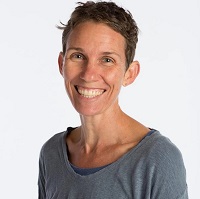Kristine Campbell, MD, MSc
The Ray E. Helfer Society Awards Dr. Kristine Campbell its Highest Honor
 Nomination Letter for Kristine Campbell, MD, MSc Nomination Letter for Kristine Campbell, MD, MSc
It is with great enthusiasm that I write this letter in support of the nomination of Dr Kristine Campbell for The Helfer Award of 2022. I am the senior Child Abuse Pediatrics fellow with the University of Utah Department of Pediatrics, and I will join the University of Utah Pediatrics faculty as assistant professor. As I have begun the long, steady march towards the forefront of my field, I feel strong hands on my back pushing me forward. I know, without looking too hard, that a pair of those hands belongs to Dr Kristine Campbell, and I also know that many others in our field have felt Dr Campbell’s influence and support.
As a successful, well-recognized, extramurally-funded researcher in Child Abuse Pediatrics, Dr Campbell has focused her research on understanding the outcomes for children with suspected child abuse or neglect. Her work has strongly advocated that the medical response to child abuse and neglect be informed and guided by the outcomes of the patients and families served. With this goal in mind, Dr Campbell has advocated for and helped thread intrinsic inter-disciplinary relationships between Child Abuse Pediatrics and Child Welfare. In doing so, she has helped build a strong relationship between both entities in the state of Utah, as well as multiple neighboring states, that other major institutions across the U.S. have now sought to model. Dr Campbell has advocated long and hard that we abandon our ‘individual silos’ and establish cross-sector relationships between child welfare agencies and medical professionals. Her work has helped highlight the effect of social risk, social intuition, and social determinants of health long before recent political developments. Dr Campbell has brought voice to ‘the other children’ since early contributions addressing the concept of the sibling-at-risk, noting that the effects of family violence and child abuse run deeper and farther than we initially may have thought. Well-versed in Delphi technique, Dr Campbell has sought to create cohesion and consensus among our field. Most recently, Dr Campbell helped construct and propel the CAPNET collaborative effort, which is certain to yield impactful research in Child Abuse Pediatrics. Her name is quickly, and emphatically, brought up by the many strong voices in our field who ask aloud ‘how does this help?’, recognizing that Dr Campbell has long been asking the same question while helping pave the way to its complex response.
While Dr Campbell’s strong focus and dedication to research is evident, her involvement in education must be equally highlighted and recognized. I have been lucky in my young career. I have come across spectacular educators, researchers, and clinicians who have been willing to invest in me as a professional. I have been given opportunities that have enabled me to meet amazing collaborators and mentors. I have rarely been told I could not do something. Those like me venturing into this field find themselves standing on the shoulders of giants, and every single person who has sought to bring me one step forward deserves honors and recognition. That’s the beauty of this field – the immense amount of excellence it harbors. However, Dr Kristine Campbell’s willingness to invest in those she teaches warrants a distinguished mention.
Dr Campbell is frequently sought out as a mentor and lecturer. At the University of Utah, and among Helfer Society colleagues, her voice is well-known as one of reason and calm that patiently seeks to reach out and further understand family dynamics in our state and others. Her active role in general pediatrics allows her to reach numerous young trainees, helping forge the future of pediatrics and the response of future pediatricians to child abuse and neglect. Dr Campbell is strategic in her thoughts and specific in her suggestions. The opportunities she brings forward to her mentees and her students are carefully thought out and matched. She thinks ahead about her mentees’ interests. While she is always respectful and kind, her feedback is precise and constructive. She seeks to build strong professionals who stand firmly on their own. She seeks to help build the future of our field. While it would be easy to limit her time and dedication to her own institution, Dr Campbell is frequently sought by trainees in other programs across the United States. Despite her numerous responsibilities and her demanding commitments, she meets, she listens, and she teaches, because teaching is a part of who she is at her core.
With great regard, respect, and a necessary bit of awe, I invite you to take a detailed look at Dr Campbell’s curriculum vitae. For those familiar with Dr Campbell’s personality – her quiet humility is further admirable given such important contributions on her CV’s pages. I suspect you will share the same admiration for the quality of her work and its long-standing impact. I believe that Dr Campbell’s CV does a stand-alone job at speaking volumes regarding her contributions to the field of Child Abuse Pediatrics, both as a researcher and an educator. I do hope, nonetheless, that this letter sheds light on the enormous influence that Dr Campbell has had on mentees and trainees like myself, who in turn take her mentorship and her guidance to produce, further mentor, and teach, propelling the next generation of our field. Dr Campbell stands firm to ensure our goals become pursuable and achievable; she pushes us to work hard, to reach high, to drive through. Every single one of us lucky enough to cross our academic and professional paths with Dr Campbell has felt her hands holding us up and pushing us on, and that is too valuable a contribution to disregard. Despite the many people whose hands have propped, helped, and held me, I can think of none other more deserving of both these awards than Dr Kristine Campbell.
Sincerely,
Tagrid-Ruiz-Maldonado, MD
|